Letters: an artist’s work shouldn’t be judged by how he leads his life
Wrong is right Sir: Having spent most of my working life in Rhodesia (now Zimbabwe), I never pass up an opportunity to catch up on what is happening in Africa. Michela Wrong’s article (‘Hotel Rwanda’, 23 April) illustrates well the incompetence of Priti Patel in sending asylum seekers to President Paul Kagame’s Rwanda against, apparently,




















